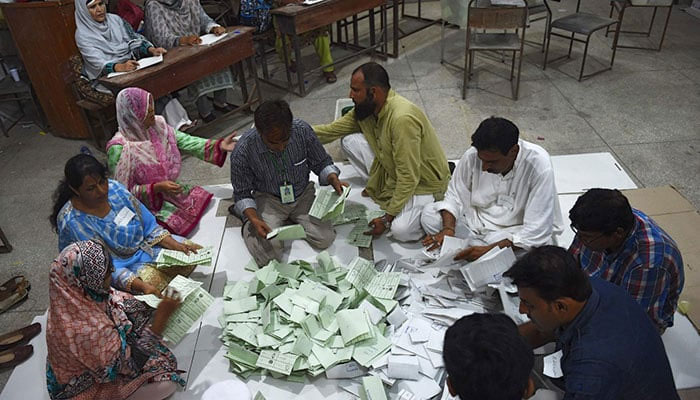Local bodies proposal
This vision of local government empowerment is long overdue and deserves serious attention in parliament
The Muttahida Qaumi Movement-Pakistan (MQM-P) has presented a constitutional amendment bill related to local governments across the country, powers of local governments, their duties and domain, reigniting a critical debate on the role and empowerment of local bodies. The proposal outlines a comprehensive framework for metropolitan, municipal, and town governments across the country, with governance structures designed for cities and towns based on population size. The bill also specifies a list of responsibilities for local governments, including urban planning, education, health, infrastructure, and local policing. This vision of local government empowerment is long overdue and deserves serious attention in parliament. The MQM has proposed metropolitan governments for Islamabad, Peshawar, Lahore, Karachi and Quetta and for every city with more than one million population whereas municipal city governments for every city with 0.3 to one million population, municipal governments for cities with population from 0.1 to 0.3 million, town governments for every town with 0.05 million to 0.1 million population, district governments for all rural districts, town committees for every town with 0.001 million to 0.05 million population, union committees in urban areas, union councils in rural areas, wards in every union committee/council, and village committees in every village.
The proposed amendments are quite comprehensive. It has been a longstanding demand of the MQM that local bodies elections should be held regularly and that there should be an empowered local government. Local governance is often described as the foundation of democratic systems, where power is devolved to the grassroots level, allowing for greater accountability, more efficient service delivery, and closer proximity to the citizens’ needs. Unfortunately, Pakistan has consistently failed to honour this democratic ideal. Despite the landmark 18th Amendment, which gave provinces autonomy and promised devolution of power to the local level, we have seen provincial governments reluctant to relinquish control. Political parties often speak of empowering local governments in their manifestos but, once in power, do little to fulfill these promises. This centralization of power within provincial governments has stunted the growth of democracy at the grassroots, where it is needed most. Local bodies have become little more than an afterthought, with provincial governments monopolizing decision-making and resources.
Ironically, it is under military regimes that local governments in Pakistan have flourished. Dictators, seeking legitimacy, have relied on local bodies to establish a semblance of grassroots governance. Civilian governments, on the other hand, seem unwilling to share power with local representatives. This resistance to devolution has created a system where members of national and provincial assemblies, whose primary role is legislation, are bogged down with issues of local administration – thana, katchery, road construction – that should lie with empowered local representatives. The MQM-P’s bill offers a solution to this persistent issue and should be debated thoroughly in parliament, with input from all political parties. If democracy is to truly flourish, political parties must move beyond mere lip service and commit to empowering local bodies. A robust local government system benefits not only individual communities but also strengthens the country’s overall democratic fabric.
-
 Jennifer Hudson Gets Candid About Kelly Clarkson Calling It Day From Her Show
Jennifer Hudson Gets Candid About Kelly Clarkson Calling It Day From Her Show -
 Shamed Andrew Was With Jeffrey Epstein Night Of Virginia Giuffre Assault
Shamed Andrew Was With Jeffrey Epstein Night Of Virginia Giuffre Assault -
 Shamed Andrew’s Finances Predicted As King ‘will Not Leave Him Alone’
Shamed Andrew’s Finances Predicted As King ‘will Not Leave Him Alone’ -
 Bad Bunny Faces Major Rumour About Personal Life Ahead Of Super Bowl Performance
Bad Bunny Faces Major Rumour About Personal Life Ahead Of Super Bowl Performance -
 Sarah Ferguson’s Links To Jeffrey Epstein Get More Entangled As Expert Talks Of A Testimony Call
Sarah Ferguson’s Links To Jeffrey Epstein Get More Entangled As Expert Talks Of A Testimony Call -
 France Opens Probe Against Former Minister Lang After Epstein File Dump
France Opens Probe Against Former Minister Lang After Epstein File Dump -
 Last Part Of Lil Jon Statement On Son's Death Melts Hearts, Police Suggest Mental Health Issues
Last Part Of Lil Jon Statement On Son's Death Melts Hearts, Police Suggest Mental Health Issues -
 Leonardo DiCaprio's Girlfriend Vittoria Ceretti Given 'greatest Honor Of Her Life'
Leonardo DiCaprio's Girlfriend Vittoria Ceretti Given 'greatest Honor Of Her Life' -
 Beatrice, Eugenie’s Reaction Comes Out After Epstein Files Expose Their Personal Lives Even More
Beatrice, Eugenie’s Reaction Comes Out After Epstein Files Expose Their Personal Lives Even More -
 Will Smith Couldn't Make This Dog Part Of His Family: Here's Why
Will Smith Couldn't Make This Dog Part Of His Family: Here's Why -
 Kylie Jenner In Full Nesting Mode With Timothee Chalamet: ‘Pregnancy No Surprise Now’
Kylie Jenner In Full Nesting Mode With Timothee Chalamet: ‘Pregnancy No Surprise Now’ -
 Laura Dern Reflects On Being Rejected Due To Something She Can't Help
Laura Dern Reflects On Being Rejected Due To Something She Can't Help -
 HBO Axed Naomi Watts's 'Game Of Thrones' Sequel For This Reason
HBO Axed Naomi Watts's 'Game Of Thrones' Sequel For This Reason -
 King Charles' Sandringham Estate Gets 'public Safety Message' After Andrew Move
King Charles' Sandringham Estate Gets 'public Safety Message' After Andrew Move -
 Lewis Capaldi Sends Taylor Swift Sweet Message After 'Opalite' Video Role
Lewis Capaldi Sends Taylor Swift Sweet Message After 'Opalite' Video Role -
 Brooklyn Beckham Plunges Victoria, David Beckham Into Marital Woes: ‘They’re Exhausted As It Seeps Into Marriage
Brooklyn Beckham Plunges Victoria, David Beckham Into Marital Woes: ‘They’re Exhausted As It Seeps Into Marriage




